

The Search For The Next Platform. I found this part of Mark Zuckerberg’s post on the Oculus acquisition most revealing: We have a lot more to do on mobile, but at this point we feel we’re in a position where we can start focusing on what platforms will come next to enable even more useful, entertaining and personal experiences.
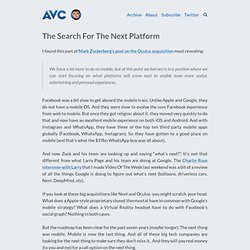
Facebook was a bit slow to get aboard the mobile train. Unlike Apple and Google, they do not have a mobile OS. And they were slow to evolve the core Facebook experience from web to mobile. But once they got religion about it, they moved very quickly to do that and now have an excellent mobile experience on both iOS and Android. And now Zuck and his team are looking up and saying “what’s next?”. If you look at these big acquisitions like Nest and Oculus, you might scratch your head. But the roadmap has been clear for the past seven years (maybe longer). It isn’t clear if the next thing is virtual reality, the internet of things, drones, machine learning, or something else. Cdixon : People new to tech don't remember... Billion Dollar Dart Throwing. Facebook’s $2 billion bet on Oculus or $19 billion spend on Whatsapp or Google paying $3.2 billion for Nest — everyone is looking to find the next platform, argues Fred Wilson.
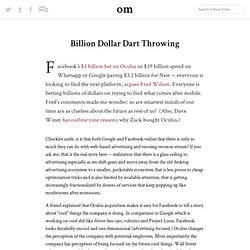
Everyone is betting billions of dollars on trying to find what comes after mobile. Fred’s comments made me wonder: so are smartest minds of our time are as clueless about the future as rest of us? (Also, Dave Winer has outline nine reasons why Zuck bought Oculus.) Chuckles aside, is it that both Google and Facebook realize that there is only so much they can do with web-based advertising and ensuing revenue stream? A friend explained that Oculus acquisition makes it easy for Facebook to tell a story about “cool” things the company is doing. Like this: The Road to VR. A month after I wrote about John Carmack, he left id Software to become the CTO of Oculus.
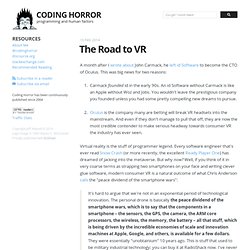
This was big news for two reasons: Carmack founded id in the early 90s. An id Software without Carmack is like an Apple without Woz and Jobs. You wouldn't leave the prestigious company you founded unless you had some pretty compelling new dreams to pursue. Oculus is the company many are betting will break VR headsets into the mainstream. Virtual reality is the stuff of programmer legend. It's hard to argue that we're not in an exponential period of technological innovation.
It's no coincidence that another programming legend, Michael Abrash, is also head over heels in love with VR. I apologize that these are both PDFs, but like everything else Abrash writes, they are amazing. I thought VR would be at best a novelty in my lifetime. There's no shortage of breathless previews, such as this one at Gizmodo which ends with. The Inside Story of How Facebook Got Oculus VR. In Google’s Shadow, Facebook’s Zuckerberg Pursued Oculus Over Several Months, Ending in Weekend Marathon of Dealmaking.
According to sources close to the situation, Facebook co-founder and CEO Mark Zuckerberg started his quest to buy Oculus VR, the maker of the nifty Rift virtual reality headset, several months ago, before wrapping up the deal this past weekend.
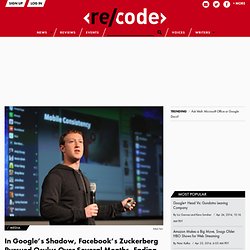
It was signed this morning. Facebook said today that it would pay $2 billion for the startup, forking over $400 million in cash, 23.1 million shares of Facebook common stock and a $300 million earn-out in cash and stock based on future performance. Sources close to the situation said that Facebook’s initial offer to the Irvine, Calif. -based Oculus came about three months ago at about a $1.5 billion valuation. In fact, in early February, Oculus CEO Brendan Iribe left the DICE gaming conference in Las Vegas to do a personal demo of the device for Zuckerberg.
For this, Oculus had attracted a lot of interest from the media and other tech giants. Facebook Buys Oculus VR for $2 Billion. Facebook will acquire Oculus VR, the makers of the virtual reality headset Oculus Rift, for $2 billion, the companies announced today.
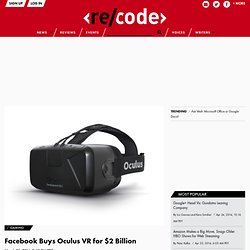
The deal includes $400 million in cash, 23.1 billion million Facebook common stock and a $300 million earn-out in cash and stock based on future performance. Oculus rose to prominence two years ago after the Rift raised $2.5 million from Kickstarter. Last year, the company raised a ton of VC funding, including a $75 million round led by Andreessen Horowitz. For the uninitiated: Users wear the Rift on their heads, and it acts as both a monitor and partial controller. A connected PC or Android device does the processing to create a three-dimensional virtual world where turning one’s head in the real world changes their focus in the virtual world. Although the Irvine, Calif. “Mobile is the platform of today, and now we’re also getting ready for the platforms of tomorrow,” Facebook CEO Mark Zuckerberg was quoted as saying in a press release.